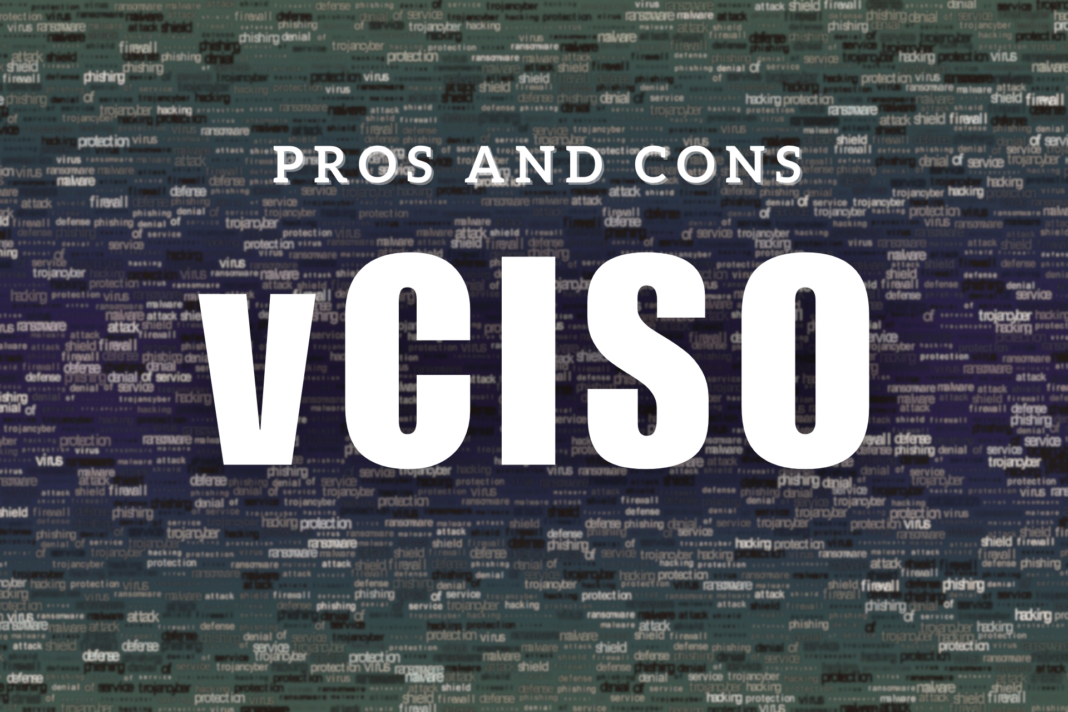An increasing number of modern security-conscious companies have Chief Information Security Officers (CISOs) on their payroll to manage the growing threat of sophisticated cyber attacks.
However, not all organizations can afford a full-time CISO due to various factors such as budget constraints, competing priorities, or a shortage of qualified candidates. As a result, many companies are turning to virtual Chief Information Security Officers (vCISOs) as an alternative solution. In this article, we will explore the concept of vCISOs, examine their benefits and drawbacks, and determine if they are an optimal solution for modern enterprise security needs.
What Is a vCISO?
A vCISO, or virtual Chief Information Security Officer, is an outsourced security practitioner who provides cybersecurity expertise and guidance remotely. Unlike traditional CISOs who work in-house as full-time employees, vCISOs offer their services on a part-time basis, as long-term contractors, or on retainer. While traditional CISOs are deeply involved in the organization’s cybersecurity department and have a thorough understanding of its operations, vCISOs operate in a more distant capacity while still being accessible and affordable.
Who Should Consider Hiring a vCISO?
Several scenarios make hiring a vCISO a viable option for organizations:
- Limited Budget: Companies with financial constraints that cannot afford a traditional full-time CISO can benefit from hiring a vCISO on a contractual basis.
- Short-Term Need: In cases where a company needs a CISO for a specific period but cannot find qualified candidates locally, a vCISO can fill the position temporarily.
- Trial Period: Organizations unsure about the necessity of a full-time CISO can try out a vCISO to assess the benefits before committing to a permanent hire.
vCISOs possess the expertise to handle various security tasks, including compliance with regulations such as HIPAA and PCI, as well as conducting vendor risk assessments. Additionally, they can provide strategic analysis for creating security policies and standards.
Benefits of vCISOs
Engaging a vCISO offers several advantages for organizations:
- Cost Savings: Traditional CISOs often command high salaries, making them financially impractical for some businesses. vCISOs, on the other hand, work on a contractual basis, allowing organizations to manage costs more effectively.
- Flexibility and Accessibility: As consultants, vCISOs can be easily replaced if the organization is unsatisfied with their services. Moreover, their availability on an “on-call” basis enables companies to reach out to them 24/7, providing continuous support for security needs.
- Global Talent Pool: Unlike in-person CISOs who are limited by geographical boundaries, vCISOs can be hired from anywhere in the world. This enables organizations to select the best-fit vCISO with the desired skill set and expertise.
Drawbacks of vCISOs
While vCISOs offer benefits, they also present some challenges that should be considered:
- Lack of Standardization: The concept of a vCISO is not rigidly defined, and service providers may have different offerings and limitations. Thorough research is crucial to understanding what a vCISO service includes before entering into a contract.
- Limited Familiarity: As virtual and contractual professionals, vCISOs often lack the deep understanding of an organization’s operations and resource limitations that in-house CISOs possess. This can affect their ability to provide tailored solutions during cybersecurity incidents.
- Divided Attention: To offer their services at a lower cost, vCISOs may divide their time between multiple organizations. This can potentially dilute their focus and expertise, as they are not solely dedicated to one organization. In contrast, in-house CISOs are exclusively committed to their employer, allowing them to focus their insights and efforts on the specific security challenges of the organization.
- Another consideration is the long-term stability of vCISOs. As temporary service providers, vCISOs may switch consulting firms or move to other contracts, leaving organizations to search for a new provider who possesses equal qualifications and expertise. The transition period between vCISOs can create a critical gap in an organization’s security posture, potentially exposing them to risks.
Conclusion
When it comes to deciding between a vCISO and an in-house CISO, there are trade-offs to consider.
vCISOs offer cost savings, flexibility, and accessibility, making them a viable option for organizations with limited budgets, short-term needs, or a desire to test the waters before committing to a permanent hire. They can handle a range of security tasks and provide valuable insights.
However, organizations must also acknowledge the drawbacks of vCISOs, such as the lack of standardization, limited familiarity with the organization, and divided attention. These factors can affect the depth of their understanding and their ability to tailor solutions to specific organizational needs.
While hiring an in-house CISO may require more time and financial investment, it can potentially provide long-term quality and consistent performance. In-house CISOs bring extensive knowledge of the organization, dedicated focus, and a deeper understanding of its operations and resource limitations.
Ultimately, the decision to hire a vCISO or an in-house CISO should be based on the unique circumstances, budgetary constraints, and specific needs of the organization. Both options have their merits, and organizations must carefully evaluate their requirements to make an informed choice that aligns with their security goals.
FAQ
Are vCISOs more cost-effective than hiring an in-house CISO?
Yes, vCISOs can be a cost-effective alternative as they work on a contractual basis, allowing organizations to manage costs more efficiently.
Can vCISOs provide 24/7 support for security needs?
Yes, vCISOs can be contracted on an “on-call” basis, providing organizations with accessibility to their expertise 24/7.
Do vCISOs have the same level of familiarity with the organization as in-house CISOs?
No, vCISOs may have limited familiarity with the organization’s operations and resource limitations compared to in-house CISOs.
Can vCISOs handle compliance requirements such as HIPAA and PCI?
Yes, vCISOs possess the expertise to handle various compliance requirements, including HIPAA and PCI.
Are vCISOs exclusively dedicated to one organization?
No, vCISOs may divide their time between multiple organizations, allowing them to provide services at a lower cost.
Dimitris is an Information Technology and Cybersecurity professional with more than 20 years of experience in designing, building and maintaining efficient and secure IT infrastructures.
Among others, he is a certified: CISSP, CISA, CISM, ITIL, COBIT and PRINCE2, but his wide set of knowledge and technical management capabilities go beyond these certifications. He likes acquiring new skills on penetration testing, cloud technologies, virtualization, network security, IoT and many more.






